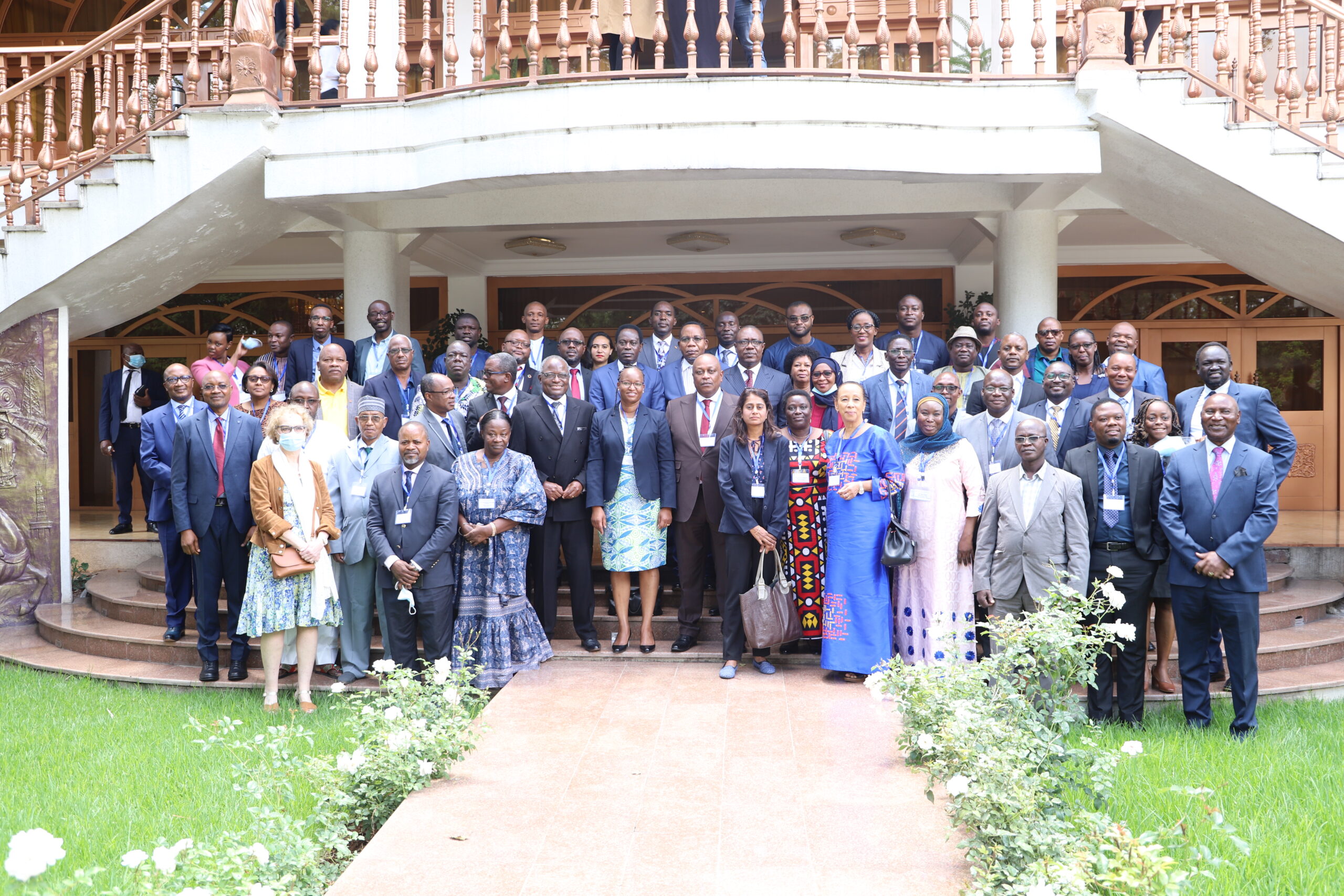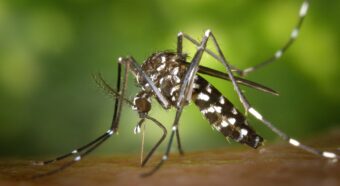African Constituencies convene to discuss the Global Fund’s 47th board meeting background papers
- May 20, 2022
- Africa / African Constituencies / The Global Fund / WCA
- By The Bureau

The Annual Consultative Meeting of the Global Fund’s African Constituency Bureau is the opportunity to bring together the 46 countries of the African constituencies to exchange views on the policy issues which are the topics for discussion on the agenda for the Global Fund Board Meeting. This year is special. The African Constituency Bureau is celebrating its fifth anniversary with an opportunity to reflect on its successes and achievements and the way forward.

After two years of virtual meetings, the African Constituencies were finally able to meet face-to-face at their Annual Consultative Meeting (ACM) in Addis Ababa, Ethiopia from 27-29 April 2022. The two-day meeting brought together 70 representatives from 42 African countries and partners. Dr. Mbungani Bungani, Minister of Health of the Democratic Republic of the Congo and incoming Board member representing West and Central Africa (WCA), opened the meeting. He affirmed that the theme of this year’s meeting, ‘Getting back on Track to end HIV, TB and Malaria’, set the stage for the task ahead of steering African countries towards ending these epidemics and contributing to pandemic preparedness and response.
The objectives of the meeting were to: (i) update constituencies and stakeholders on the progress and achievements made in 2021; (ii) engage and reach consensus on salient policy discussions during the Global Fund’s 47th Board meeting and (iii) identify key HIV priorities for the 2023-2025 cycle.
Who is the African Constituencies Bureau?
The African Constituencies Bureau brings together the two African constituencies (East and Southern Africa (ESA) and WCA) represented at the Global Fund. They comprise 46 African countries that are recipients of Global Fund support for HIV, TB and malaria (HTM). The ACB’s focus is on tackling health policy challenges that are preventing Africa from ending the three epidemics. Most importantly, the Bureau provides member countries and their respective constituency delegations with access to first class technical support in analyzing and identifying solutions to critical global and regional issues related to resilient and sustainable systems for health (RSSH).
The Africa Constituencies’ Governance Framework emphasizes the value of increasing the participation and meaningful engagement of African Constituencies in Global Fund processes and decision-making. It brings together various African stakeholders that include constituent countries from ESA and WCA; implementer governments, representative of Country Coordinating Mechanisms (CCMs); the African Union, Regional Economic Communities (RECs) such as the East African Community (EAC), Economic Community of Central African States (ECCAS) and West Africa Health Organization (WAHO); technical partners including the World Health Organization African Region (WHO AFRO), the Joint United Nations Programme on HIV and AIDS (UNAIDS), leading African academics, and civil society organizations (CSOs), to discuss policy-level issues relating to the Global Fund in Africa. Thus, the ACM provides an excellent opportunity for African Constituencies to come together, discuss in detail and reach consensus over policy issues that feed into discussions on Global Fund governance discussions.
ACB policy discussions prior to the Board meeting
Before the Global Fund 47th Board meeting held 10-12 May 2022, the African representatives on the Global Fund Committees and the Board conducted extensive consultations with the 47 countries they represent. The consultations covered agenda items of particular interest and relevance to the constituent countries, and issues that the constituencies wanted their representatives to raise during the Committee and Board meetings.
Allocation Methodology for 2023-2025
Every three years, the Global Fund’s allocation methodology is reviewed in preparation for the upcoming allocation period. For the forthcoming period, the allocation methodology needs to present significantly higher funding scenarios in view of the Seventh Replenishment’s Investment Case which asks for at least $18 billion to get back on track towards ending HTM.
The allocations will be implemented under the Global Fund’s new Strategy. In addition, countries will be financing their HTM responses under intense fiscal pressures after having been significantly impacted by COVID-19. Within this context, the allocation methodology was reviewed to develop a robust approach for the 2023-2025 allocation period. The review aimed to refine the model to achieve greater impact with the resources available.
Countries exchanged views around the refinements proposed in the 2023-2025 allocation methodology and why, and what further needs to be done to move forwards.
The Global Fund Secretariat proposed maintaining the allocation methodology’s technical parameters because they remain robust in the current context. The Secretariat recommended a refinement to the scale-up and paced reduction approaches in the allocation methodology formula to provide paced reduction components with less of a decrease in the formula under significantly higher funding levels.

The African Constituencies together with France, Point7 and Germany requested that the Board discuss and find ways to increase RSSH investments up to a minimum of 20%; the reality in the field is that countries within the Challenging Operating Environment (COE) category are hampered by the lack of flexibility of grant allocations whereby only 10 % of the total grant can be allocated to RSSH. The group discussed possible changes to implementation, and they also discussed how African RSSH investments are performing: successes, challenges, and recommendations for improvement. As the meeting agreed, health systems are important; given the high burden of HTM disease worldwide, it is impossible to win the fight against malaria, TB, HIV or any other disease without a strong health system, including community systems. This premise was at the centre of the ACM’s insistence that there should be greater focus on RSSH.
Many frontline services are often provided in the community or at the lowest levels of care. Hence, a strong procurement and supply chain system until the last mile is of paramount importance. That is why community systems, human resources for health, and data systems also matter. These systems are also vitally important for surveillance for pandemic preparedness and response. For this to be effective, African countries need effectual investments and RSSH standalone grants with longer terms to achieve the necessary results. The Secretariat could consider aligning health system investment milestones with the Global Fund three-year cycle.
Other challenges mentioned by the group members include the lack of clear guidance for RSSH investment. Countries do not really know how to integrate the RSSH component into the funding requests and it was for this reason that in 2019 the ACB, in partnership with Aidspan, held a workshop in Benin on “For a better integration of health system strengthening in funding requests”.
Catalytic Investments 2023-2025
The 2023-2025 allocation period marks the start of the six-year 2023-2028 Global Fund Strategy. Together with country allocations and other levers, catalytic investments for this period are important to deliver the ambitious goals of the new Strategy. To recommend catalytic investments for the 2023-2025 allocation period, the Secretariat and technical partners reviewed lessons learned and the progress of existing catalytic priorities and considered potential new priorities necessary to deliver the Strategy, in line with the prioritization approach endorsed by the Strategy Committee (SC).
ACM participants discussed the catalytic priorities for the forthcoming period, how the recommended catalytic priorities determined and how their amounts were grouped under different funding scenarios.
The African Constituencies requested information on modalities as the Technical Evaluation Reference Group (TERG) evaluation had highlighted both the successes and the shortcomings of catalytic investments. In its current form, the Constituencies did not support the decision; catalytic investments are not always aligned with in-country priorities and sometimes take the back seat to other grants. In-country catalytic investments may not be linked with the Global Fund’s in-country oversight processes. Addressing these shortcomings will help to maximize the impact of these investments.
The ACM also discussed whether the catalytic investments for the New Funding Model achieved their intended results, the successes, and challenges, and made recommendations for increased impact.
Grant financial performance: Absorption as of 31 December 2021
Following the presentation of a table of grant financial performance showing the percentage of absorption rate, the discussion focused largely on how to improve absorption for the next cycle: health equipment (absorption 74%), capacity building and technical assistance (absorption 84%) had lower national absorption compared to NFM 1.
Countries recommended that the Global Fund be asked to provide further clarification on why these investments had lower absorption rates and wanted to see the absorption percentage per disease (and per category (equipment and capacity building) if readily available) as well as information on which financial performance measures helped increase absorption (or reduce it). They also discussed countries’ risk matrices to be able to compare with the average minimum acceptable level of absorption; and which risk management measures worked or did not.
Risk Management Report and Annual Opinion of the Chief Risk Officer
Following the discussions on the grant financial performance, the countries exchanged on what progress has been made with the implementation of HTM programs and COVID-19 Response Mechanism (C19RM) investments, what the outlook is for key ‘thematic risks’ and is the organization within risk appetite and on track to meet target risk levels within agreed timeframes. They also discussed the risk management priorities for 2022, and the Chief Risk Officer’s opinion on the outlook for 2022 including key risks and the readiness of the organization to respond to those risks.
All these factors are contributing to elevated levels of risk because, from a risk management perspective, 2022 will be a challenging year with continued volatility. However, strong foundations have been laid and risk trajectories are starting to stabilize with a target of decreasing over the medium-term.
Office of the Inspector General (OIG) report for 2021
The participants discussed the OIG reports on:
- Investigation into TANA netting.
- Investigation into the Nigerian supply chain.
- Audit of Global Fund internal financial controls.
- Audit of grants closure processes.
- Investigation into misconduct affecting Global Fund grants.
- The OIG Annual Report 2021 on an investigation into the misappropriation of funds in the Malawi HIV grant; an investigation into daily subsistence allowance in Namibia; the audit of Global Fund grants in Cameroon; and the audit of procurement and supply chains during the COVID-19 pandemic
In addition to exchanging views on these reports, the ACM also discussed the need to better understand how fiscal agents are performing in African countries and requested the Board to extend its research to investigate how the fiscal agent model, which has given rise to some challenges, could be improved. The meeting requested the Board to propose extensive modifications to this model.
Participants also tried to discuss the sensitive topic of the Prevention of Sexual Exploitation, Abuse, and Harassment (PSEAH) but they found it to be a complex topic which would benefit from a detailed session of its own.
Global Fund Secretariat staff joined the ACM and provided an overview and updates on each of the above issues and responded to countries’ questions or requests for clarifications.
Five years of serving African constituencies

The meeting was also an opportunity to celebrate the ACB five-year anniversary. From its early beginning in 2012 to becoming fully functional in 2017, the path has been long with many challenges but also several achievements. The representation of African Constituencies has improved in terms of preparation and participation.


